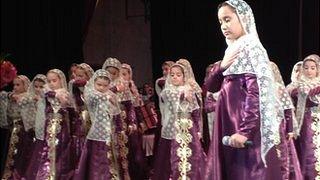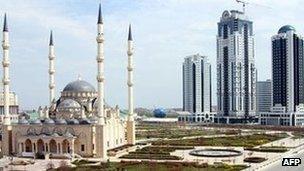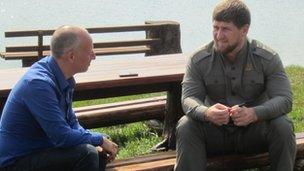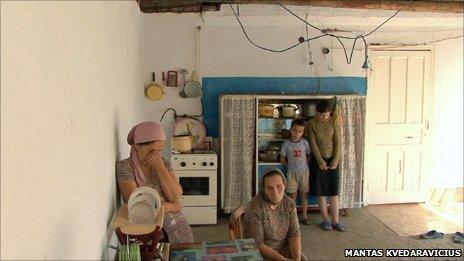Kadyrov's Chechnya rises from the ashes, but at what cost?
- Published
Steve Rosenberg takes a walk down Putin Avenue in the centre of Grozny
At a concert in Grozny, a children's choir sings about the former Chechen President Akhmat Kadyrov, who was blown up by the rebels eight years ago.
The subject matter is not pleasant, but the singers are stunning: the girls in white lace headscarves and beautifully embroidered purple dresses; the boys with fur hats, daggers and fake ammunition strapped to their coats.
When the son of the assassinated president takes the stage, the applause is almost as long as the Caucasus mountain range.
His name is Ramzan Kadyrov and he is running Chechnya now.
You can tell by the number of times his portrait appears around Grozny - on billboards, on top of buildings, even outside car showrooms.
The Kadyrovs were once rebels themselves. Then they switched sides. Since Akhmat's death, the Kremlin has relied on Ramzan and his armed militia to put down the insurgency and to rebuild Chechnya.

Girls are encouraged to wear headscarves in the new Grozny
So far, the plan is working.
Less than a decade ago, the UN described Grozny as "the most destroyed city on earth".
Today, the Chechen capital echoes to the sound, not of bullets, but of popcorn machines on street corners and construction work.
There are sushi bars, beauty parlours, skyscrapers, even a "karaoke comedy club". Billions of dollars of aid from Moscow have funded the facelift and helped the Chechen capital rise from the rubble.
'Rights abuses'
But the man who has overseen this revival is highly controversial.
Human rights groups accuse Ramzan Kadyrov of persecuting critics and committing abuses in his fight against insurgents; court papers in the UK have revealed that the intelligence agency MI5 considers him responsible for the deaths of political opponents.
When I meet Ramzan Kadyrov in the grounds of his presidential palace, I ask if the allegations are true.
"The life we are building today is wonderful," Ramzan Kadyrov says.

Grozny's new mosque is said to be the largest in Europe
"But the West and Europe don't want that. They say that Kadyrov is a bandit. If there's an incident in Europe, they say Kadyrov's behind it. If someone's cow dies, Kadyrov's to blame. If a chicken's not laying eggs, it's Kadyrov's fault.
"They are prepared to do anything to blacken Kadyrov's name. And tell the world that Kadyrov is a bad person. I tell them: 'Prove it!'"
And what of claims that Kadyrov he has prepared hit lists of his political opponents? Chechnya's leader bursts out laughing.
"The person who makes this claim is schizophrenic," he smiles. "I swear to Allah, that idea would never come to my mind."
'Islamisation'
While rebuilding Chechnya, Ramzan Kadyrov is promoting what he calls "traditional Islam": it is making Chechnya feel less and less part of Russia.
Alcohol is no longer freely available in the shops; there are segregated sports facilities for men and women; at the computer store, you can buy an iPad and pick up a free copy of the Koran; painted on the ceiling of my Grozny hotel room is an arrow pointing towards Mecca.
Under Mr Kadyrov, there is also a stricter Islamic dress code. I meet one woman who tells me that she had been threatened for not wearing a headscarf in public.
She is deeply concerned by the policy of Islamisation. Fearing reprisals, the woman asks to remain anonymous.
"My niece said that a man came to her nursery school," she recalls.
"He told all the children to ask their parents whether or not they prayed, then report back to him. He said that if they didn't pray, the parents and children would go to hell.
"Clerics are going into schools and telling six-year-old boys to control their sisters, and that if their sisters don't wear headscarves, the boys will be held responsible and punished by God.

Ramzan Kadyrov is promoting what he calls traditional Islam
"I'm terrified. I think 10 years from now, we'll have raised a whole generation of religious extremists."
Ramzan Kadyrov denies that his brand of Islam is extremist.
Nor does he accept that "traditional Islam" violates women's rights.
"Paradise lies at the feet of the mother," he tells me.
"So how can a Chechen, a Muslim, violate the rights of women? I love my mother, my wife, my sisters very much. I honour and respect them. Women are the keepers of the family. All these allegations have been made up."
Back at the concert, the children have left the stage. Now an adult choir is singing the anthem of the Chechen Republic.
"No matter how unfair the wildfire of injustice, you, Chechnya, kept falling and rising again," they sing.
Chechnya is rising again. But where is it heading? It certainly feels as if it is drifting further and further from Moscow.
- Published17 January 2018
- Published17 July 2011
